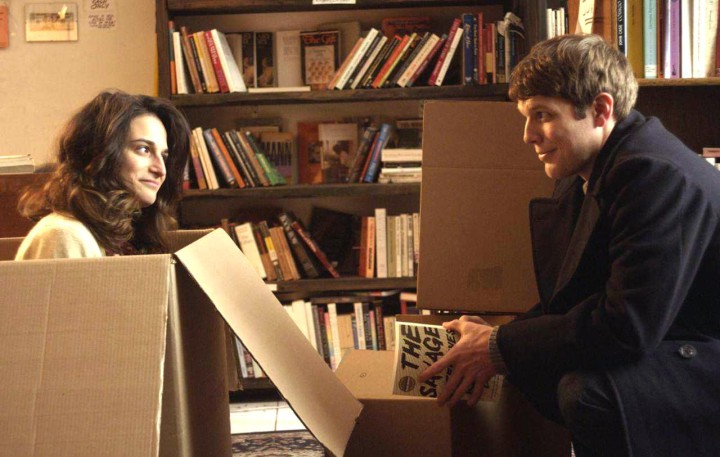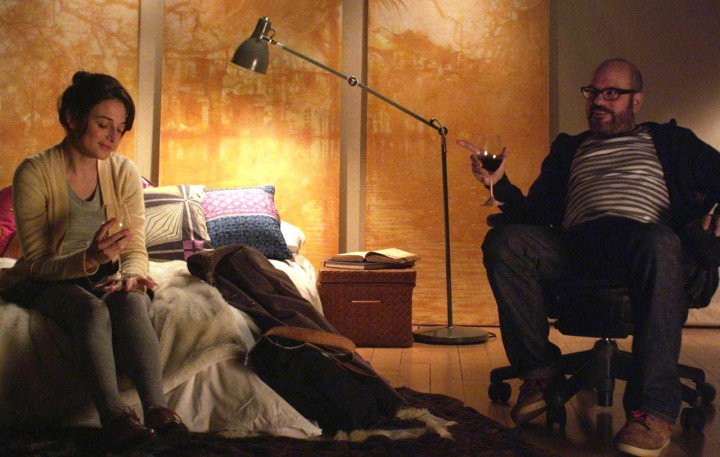I really wanted to like this film — if only because I deeply resent being up and ready to go out into the world by 8 a.m. on a Sunday morning to be confronted with a movie I don’t enjoy. For that matter, I’d far rather like a movie than not, but Obvious Child was simply not a movie I could like. It’s a basic rom-com complete with all the tropes — wisecracking girlfriend, gay best friend, parent problems and the penultimate reel of gloom. However, it has been deemed “edgy” because it attempts to normalize abortion (which doesn’t bother me) and because its heroine is self-obsessed, obnoxious and crude (which does bother me). Now, before somebody screams “sexism,” I’d feel exactly as negative about a male character who fit that description — if the movie wanted me to relate to and sympathize with that character, which is clearly the case with Donna Stern (Jenny Slate).
Donna works in an about-to-close bookstore and hones her craft (if that it can be called) as a stand-up comic in some dive that seems to seat maybe 20 people. (I guess that has the upside of attaining standing-room-only status most of the time.) She is painfully unfunny and unprofessional. Donna’s stand-up “routine” consists entirely of detailing how gross she is, decrying her sex life and cataloguing her bodily functions. I had no trouble believing every word and would have been perfectly happy to leave the whole thing there. Unfortunately, this was about five minutes into the movie. There was more to come — even if often seemed like less. In short order: Donna is dumped by her boyfriend, gets trashed, leaves endless alternately whiny and angry messages on his voice mail, ends up in the sack with really nice guy Max (Jake Lacy), gets pregnant and decides to have an abortion. In fairness, a lot of this is believable. Anyone with an ounce of sense would dump her. I’ve been on the receiving end of those sort of phone messages and can attest that these are realistically creepy and psychotic. Unfortunately, I think we’re supposed to find them endearing. Similarly, we’re supposed to be charmed by the fact that the apparent selling point for her attraction to Max (who looks like he ought to be recruiting for a Bible college) is the fact that he accidentally breaks wind in her face. (This could well become a new “meet cute” standard.) It’s that kind of movie.
Now the problem becomes how to keep this plot going. First, she has to wait two weeks to get her abortion — putting it on Valentine’s Day, which I concede is a nice touch. Then, apart from the requisite encounters with her parents, there’s mileage to be gotten out of avoiding the mystifyingly smitten Max and debating whether or not to tell him about the pregnancy. There’s also time for an embarrassing drunken comedy routine and a pointless meeting with another comic (David Cross) that is slightly less funny than a cholera epidemic. What makes any of this unusual is the approach the film takes to abortion, but apart from not playing out like this aspect of the story usually would, it’s not enough to sell this load of clams — at least to me. Goodness knows, quite a lot of critics are gaga over it.
Besides the fact that I found the movie just monumentally unfunny, the big problem is Jenny Slate’s Donna. I haven’t been this put off by anyone since I saw Lena Dunham in Tiny Furniture (2010) — another supposed edgy comedy about a self-absorbed, whiny, entitled character. The only thing Slate’s Donna lacks is the tendency toward exhibitionism, but aren’t her verbal outbursts of oversharing pretty much the same thing? I guess Donna is the poster girl for the social media age where people tweet and post the most intimate and mundane events as if the world needed to be wired to their every unfiltered mood swing. Personally, I wanted to buy back my introduction to her. That said, I did like it better than Tiny Furniture. At least Obvious Child looks like a real movie. Plus, the character of Max is interesting in that he defies the stereotype he appears to represent, but this isn’t enough to make this a movie I wouldn’t cross the street to avoid. Rated R for language and sexual content.
Playing at Fine Arts Theatre








I haven’t been this put off by anyone since I saw Lena Dunham in Tiny Furniture (2010)
You should watch Girls.
Girls is a fine program, but it is not for everyone.
You mean like not for anyone who had enough of her exhibitionism, self-absorption, over-privileged whining and sense of entitlement in Tiny Furniture?
Correct.
But still it’s a “fine program?”
Yes.
I doubt that so much that it verges on the supernatural.
Tiny Furniture was enough Dunham for me for life.
“Tiny Furniture was enough Dunham for me for life.”
Its like that but shes naked in almost every other episode and a lot of graphic sex .
I’ll pass. The high water mark of her career to me seems to be her wholly extraneous role as a barrista in The Innkeepers.